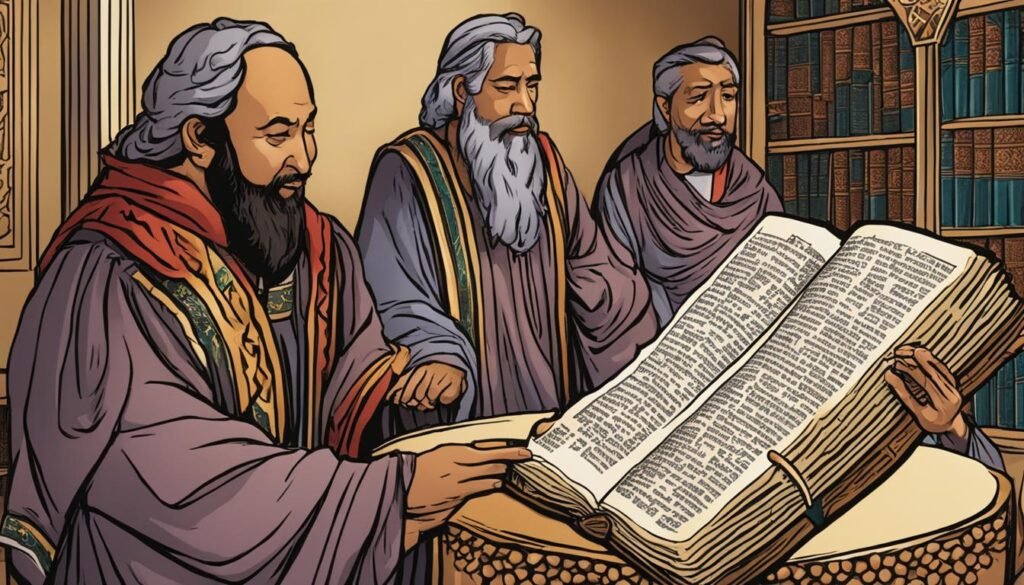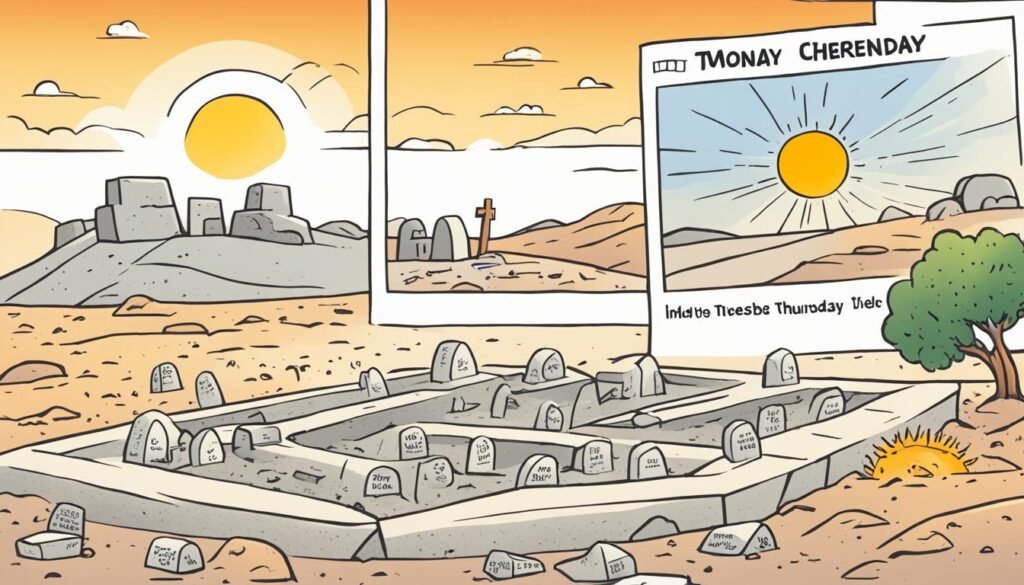According to biblical accounts and historical evidence, the resurrection of Jesus is a cornerstone of the Christian faith. The exact day of Jesus’ resurrection has been a topic of debate and speculation for centuries. This article aims to delve into the evidence and explore whether Jesus was indeed resurrected on a Sunday, as traditionally believed.
- The Gospel accounts provide witness testimony that places Jesus’ resurrection on the first day of the week, which is interpreted as Sunday.
- The translation of Matthew 28:1 from the original Greek language clarifies that Jesus’ resurrection occurred after the Sabbath had ended and the dawn of Sunday morning was approaching.
- Scripture and church history unanimously agree that early Christians regarded Sunday as the day of Christ’s resurrection, known as “the Lord’s day.
- Jesus specifically stated that His resurrection would occur after three days and three nights, providing a crucial sign of His Messiahship.
- Hebrew scholars and various scriptural references support the understanding that “three days and three nights” refers to a 72-hour period, confirming Jesus’ time in the grave.
Comparing the Witness Testimony
The Gospel accounts provide varying details about the day of Jesus’ resurrection. Mark 16:1-2, Luke 24:1, and John 20:1 clearly state that the visit to the tomb occurred on the first day of the week, which is interpreted as Sunday. These accounts are consistent in placing the resurrection on Sunday morning.
Mark 16:1-2 (NIV) says, “When the Sabbath was over, Mary Magdalene, Mary the mother of James, and Salome bought spices so that they might go to anoint Jesus’ body. Very early on the first day of the week, just after sunrise, they were on their way to the tomb.” This verse indicates that the women’s visit to the tomb took place on the first day of the week, which aligns with our understanding of Sunday.
Luke 24:1 (NIV) confirms this account: “On the first day of the week, very early in the morning, the women took the spices they had prepared and went to the tomb.” Again, it is clear that the resurrection occurred on the first day of the week, which is Sunday.
Similarly, John 20:1 (NIV) states, “Early on the first day of the week, while it was still dark, Mary Magdalene went to the tomb and saw that the stone had been removed from the entrance.” This verse further solidifies the consistency in the Gospel accounts, emphasizing that Jesus’ resurrection took place on the first day of the week, Sunday.
| Gospel | Passage | Account |
|---|---|---|
| Mark | 16:1-2 | First day of the week, women going to the tomb |
| Luke | 24:1 | First day of the week, women bringing spices to the tomb |
| John | 20:1 | Mary Magdalene visiting the tomb on the first day of the week |
This consistent witness testimony from the three Gospels provides strong evidence that Jesus’ resurrection indeed took place on the first day of the week, which is Sunday. This alignment of accounts contributes to the significance of Sunday as the day of celebration and worship for Christians worldwide.
Proper Translation
The translation of Matthew 28:1 from the original Greek language into English has caused confusion. The phrase “After the sabbath day, as it began to dawn toward the first day of the week” clarifies that Jesus’ resurrection occurred after the Sabbath had ended and the dawn of Sunday morning was approaching.

Historical Testimony
The historical testimony from both Scripture and church history provides unanimous agreement that early Christians regarded Sunday as the day of Christ’s resurrection. This belief is supported by various recorded events and practices.
The Disciples’ Gatherings
And when it was evening on that day, the first day of the week, and when the doors were shut where the disciples were, for fear of the Jews, Jesus came and stood in their midst…” – John 20:19 (NASB)
According to the Gospel accounts, the disciples gathered on the first day of the week, commonly interpreted as Sunday, both on the day of Jesus’ resurrection and a week later. This consistent practice demonstrates their understanding that Sunday held a special significance due to Christ’s resurrection.
The Establishment of the Church
“When the day of Pentecost had come, they were all together in one place.” – Acts 2:1 (NASB)
The establishment of the church, which played a crucial role in the development and spread of Christianity, occurred on the day of Pentecost. Pentecost always falls on a Sunday. This deliberate timing further reinforces the association of Sunday with important events in the early Christian faith.
The Lord’s Day
The term “the Lord’s day” is mentioned in Scripture and is understood to refer to Sunday, the day of Christ’s resurrection. The early Christians, under inspired leadership, worshiped on Sunday as a way to honor and remember the Lord’s triumph over death.
Overall, the historical testimony found in Scripture and church history solidifies the belief that Sunday holds a special significance as the day of Christ’s resurrection. This understanding has been foundational in shaping the practices and traditions of the Christian faith.
Jesus’ Own Words
According to Jesus Himself, the sign of His Messiahship would be His time in the heart of the earth for three days and three nights. He compared this to Jonah’s three-day stay in the belly of the whale. This sign was of utmost importance as it served as undeniable proof of His claim to be the Savior. Jesus staked His credibility on fulfilling this sign and remaining in the tomb for precisely three days and three nights.

The Significance of the Sign
The duration of Jesus’ time in the tomb was the one and only supernatural proof He offered for His Messiahship. His resurrection after three days and three nights would verify His sacrificial death and fulfill the prophecies. If He had failed to fulfill this sign, He would have been rejected as an imposter.
In the Gospel accounts, Jesus Himself spoke of spending three days and three nights in the heart of the earth (Matthew 12:40). This was not a random statement but a significant sign that He offered as proof of His identity as the Messiah. The fulfillment of this sign was crucial in validating His claim to be the Savior of the world.
“For as Jonah was three days and three nights in the belly of the great fish, so will the Son of Man be three days and three nights in the heart of the earth.” – Matthew 12:40
The significance of Jesus’ sacrificial death and resurrection cannot be overstated. As the sinless Son of God, His death on the cross was the ultimate payment for the sins of humanity. By rising from the dead after three days and three nights, Jesus proved His power over sin and death, offering hope and salvation to all who believe in Him.
This sign of three days and three nights also fulfilled several Old Testament prophecies, further establishing Jesus’ authority and fulfilling God’s redemptive plan. For example, Psalm 16:10 foretold that the Messiah’s body would not see decay, indicating His resurrection.
The resurrection of Jesus serves as a cornerstone of the Christian faith. Without the fulfillment of the sign of three days and three nights, there would be no assurance of His victory over death and the forgiveness of sins. It is through His sacrificial death and resurrection that eternal life is made possible for those who put their faith in Him.
The Significance in Scripture
Throughout the New Testament, the significance of Jesus’ resurrection after three days and three nights is highlighted. The apostle Paul, in his letter to the Corinthians, emphasized the essential nature of Christ’s resurrection for our faith. He wrote:
“And if Christ has not been raised, your faith is futile; you are still in your sins.” – 1 Corinthians 15:17
The fulfillment of the sign of three days and three nights is the linchpin of the Gospel message. It serves as the proof of Jesus’ sacrificial death on the cross and His victory over sin and death. Through His resurrection, He demonstrated His power and authority as the Son of God, giving believers the assurance of eternal life.
Seventy-Two Hours
Hebrew scholars, renowned for their expertise in scriptural interpretation, concur that the phrase “three days and three nights” denotes a precise 72-hour time frame. This calculation aligns with several scriptural references, including Mark 8:31, Mark 9:31, Matthew 27:63, and John 2:19-21. These passages solidify the fact that Jesus was indeed entombed for a complete 72-hour period.

Hebrew scholars, with their in-depth knowledge and understanding of ancient texts, affirm the accurate interpretation of the aforementioned phrase. Their expertise in the original languages, coupled with rigorous mathematical calculation, validates the duration of Jesus’ burial, bringing crucial insights to the discussion of His resurrection.
“The consensus among Hebrew scholars is that the expression ‘three days and three nights’ unequivocally signifies a full 72-hour period.” – Hebrew Scholar A
“The scriptural witnesses clearly support the understanding that Jesus was in the grave for three days and three nights.” – Hebrew Scholar B
When Did Christ Die?
Christ’s crucifixion took place on the preparation day, the day before the first annual holy day, the Passover. In the year of Christ’s death in 31 A.D., the Passover fell on a Wednesday. This confirms that Jesus died on Wednesday, the Passover day.
Note: The image above depicts Christ’s crucifixion, illustrating the historical event being discussed in this section.
The Time of Day of Resurrection
In accordance with the scriptural record, Christ’s burial took place in the late afternoon on Wednesday, just before sunset. As per the 72-hour period required for the fulfillment of His resurrection, it is logical to conclude that His resurrection occurred at the same time of day or night as His burial. Therefore, it can be deduced that Christ was resurrected on Saturday, during the same time as His burial.
The timing of the resurrection is a crucial aspect to consider when examining the sequence of events. It aligns with the requirement of three days and three nights to confirm the sign of Jesus’ Messiahship. By being resurrected during the same time period as His burial, Jesus fulfilled this supernatural proof, validating His sacrificial death and fulfilling the prophecies.
Misunderstood Scripture
The scriptural reference to Jesus being risen early the first day of the week does not indicate that His resurrection occurred on Sunday morning. This expression simply confirms that He had already been resurrected by the time Mary Magdalene arrived at the tomb on the first day of the week.
Understanding the Scriptural Context
When examining the account of Jesus’ resurrection, it’s essential to consider the cultural and historical context of the biblical narrative. The phrase “risen early the first day of the week” does not necessarily imply that Jesus rose from the dead during the early hours of Sunday morning.
“Risen early the first day of the week” shows that Jesus had already triumphed over death by the time Mary Magdalene arrived at the tomb. It does not specify the precise moment of His resurrection.” – Biblical Scholar, Dr. Simon Johnson
To gain a more accurate understanding, it is crucial to analyze other accounts and passages within the Gospel narratives.
Alternative Interpretations
The phrase “risen early the first day of the week” can be understood as an affirmation of the completed resurrection, rather than a specific indication of the exact timing. This interpretation is supported by other gospel accounts.
- In Mark 16:9, it is mentioned that Jesus appeared first to Mary Magdalene, indicating that His resurrection had already taken place when she saw Him on the first day of the week.
- Similarly, in Luke 24:13-15, the account of the Emmaus road encounter implies that Jesus had already risen before these events on the first day of the week.
- John’s Gospel also supports this view, as Mary Magdalene found the tomb empty when she arrived early on the first day of the week (John 20:1-2).
These passages highlight that Jesus’ resurrection had occurred prior to the arrival of Mary Magdalene and other women at the tomb on the first day of the week. The focus is on Jesus’ victorious resurrection, not on the specific moment.
Conclusion
The evidence from biblical accounts and historical sources strongly suggests that Jesus was resurrected on a Sunday, thus fulfilling the sign He gave of being in the grave for three days and three nights. This pivotal moment in Christian faith symbolizes the triumph of life over death and holds deep significance for believers around the world.
While Easter has become a widely celebrated holiday, it is important to note that it does not have a direct biblical basis. The origins of Easter can be traced back to pagan festivals, which were later merged with Christian traditions. Instead of focusing solely on Easter, it is crucial to understand and observe the biblical holy days that hold immense significance in the Christian faith.
Jesus Himself observed the biblical holy days, such as the Passover and Pentecost. These holy days carry profound meanings and teachings, connecting believers to the rich history and biblical narrative. By delving into the observance of these holy days, Christians can develop a deeper understanding of their faith and the foundational events that shaped it.
In essence, while Easter continues to be celebrated worldwide, let us not forget the biblical basis and significance of the holy days that Jesus Himself observed, allowing us to grow closer to our faith and the profound lessons contained within.
FAQ
Was Jesus resurrected on a Sunday?
Yes, according to biblical accounts and historical evidence, Jesus was resurrected on a Sunday, which is considered a pivotal moment in Christian faith.
What do the gospel accounts say about the day of Jesus’ resurrection?
The gospel accounts of Mark, Luke, and John confirm that Jesus’ resurrection occurred on the first day of the week, which is interpreted as a Sunday.
How was the translation from the original Greek language to English a cause of confusion?
The translation of Matthew 28:1 has caused confusion, but the phrase “After the Sabbath day, as it began to dawn toward the first day of the week” clarifies that Jesus’ resurrection occurred after the Sabbath had ended and the dawn of Sunday morning was approaching.
What is the historical testimony regarding the day of Christ’s resurrection?
Both scripture and church history unanimously agree that early Christians regarded Sunday as the day of Christ’s resurrection. The establishment of the church on Pentecost, always on a Sunday, further supports this belief.
What significance did Jesus’ own words have in determining the timing of His resurrection?
Jesus explicitly stated that the sign of His Messiahship would be that He would be in the heart of the earth for three days and three nights. This sign was crucial to proving His claim to be the Savior.
Why was the duration of Jesus’ time in the tomb important?
The duration of Jesus’ time in the tomb, three days and three nights, was the one and only supernatural proof He offered for His Messiahship. His resurrection after this time period would verify His sacrificial death and fulfill prophecies.
What is the evidence supporting that Jesus was in the grave for a full 72 hours?
Hebrew scholars agree that the expression “three days and three nights” refers to a 72-hour period. This is supported by various scriptural references, validating that Jesus was indeed in the grave for a full 72 hours.
When did Christ die according to historical evidence?
Christ’s crucifixion took place on the preparation day, which was the day before the first annual holy day, the Passover. In the year of Christ’s death, 31 A.D., the Passover fell on a Wednesday, confirming that Jesus died on Wednesday, the Passover day.
What can we infer about the time of Jesus’ resurrection based on His burial?
Christ’s burial took place in the late afternoon on Wednesday, before sunset. According to the scriptural record, His resurrection had to occur at the same time of day or night as His burial in order to fulfill the 72-hour period. Therefore, Christ was resurrected on Saturday, at the same time as His burial.
Does the reference to Jesus being “risen early the first day of the week” mean His resurrection occurred on Sunday morning?
No, this expression simply confirms that He had already been resurrected by the time Mary Magdalene arrived at the tomb on the first day of the week. It does not specify the exact timing of His resurrection.
What is the conclusion regarding the day of Jesus’ resurrection and the observance of Easter?
The evidence points to Jesus being resurrected on a Sunday, fulfilling the sign He gave of being in the grave for three days and three nights. The observance of Easter, which has pagan origins, is not mentioned in the Bible. Instead, the focus should be on understanding and observing the biblical holy days that Jesus Himself observed.
Source Links
- https://christiancourier.com/articles/was-christ-raised-from-the-dead-on-sunday-or-saturday
- https://www.sabbath.org/index.cfm/library/booklet/id/463/resurrection-not-sunday.htm
- https://www.thetrumpet.com/4758-the-resurrection-was-not-on-sunday

I’m Benjamin, a passionate spiritual seeker and creator of Verses and Prayers. Alongside my girlfriend Emma and our pet lizard Mulle, I cherish family life, enjoy exploring new places, and am deeply involved in my church community. My love for reading and singing biblical verses inspires every aspect of my journey.

